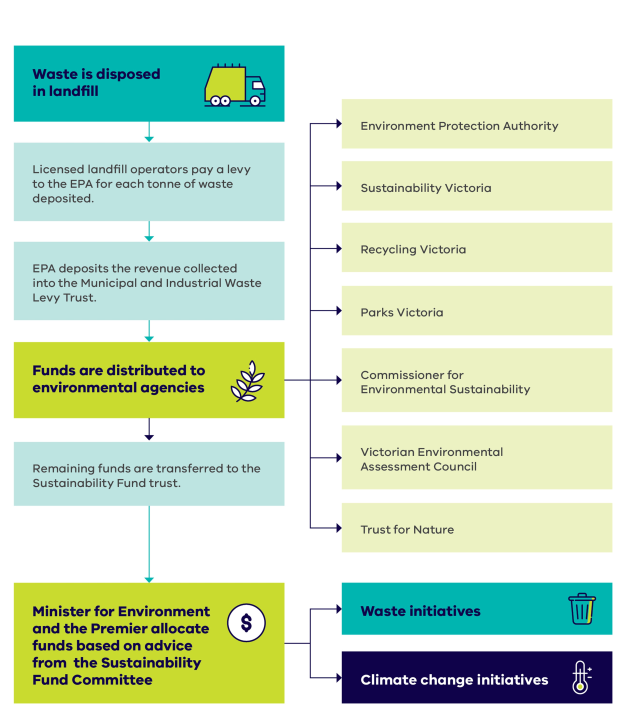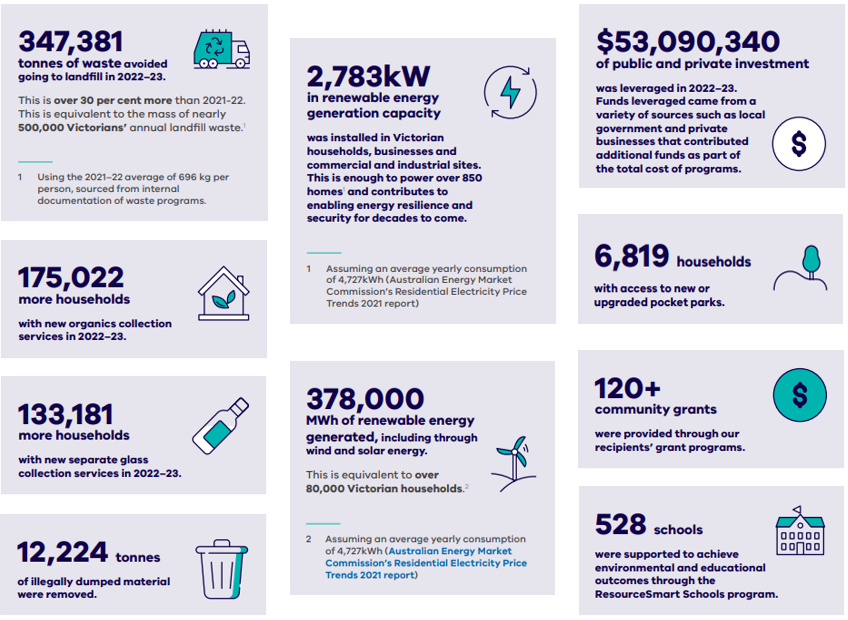About
The Sustainability Fund is the strategic funding source for Victorian state government programs supporting climate change action and waste reduction. Encouraging innovation, best practice and providing predictability for investment in Victoria, current programs cover a diverse range of portfolios from renewable energy, protecting Victoria's environment and biodiversity, recycling infrastructure and supporting new sectors with legislation and new policies.
Across this breadth of work the Fund’s programs engage with a cross-section of Victoria supporting businesses, local governments and communities.
The Sustainability Fund targets investment towards delivery of state government policy priorities and implementation of important strategies such as, Victoria’s Circular Economy Strategy, Climate Action, the Renewable Energy Transition and environmental protection.
In 2022-23, the Fund provided $167.2 million to a range of waste reduction and climate action initiatives. Over the past 5 years, more than $1 billion from the Fund has been invested in waste reduction and climate change initiatives. As a result of that investment, almost 1 billion tonnes of waste have been diverted from landfill, almost 10,000 kilowatts of renewable energy capacity were deployed, and over 310,000 CO2 equivalent emissions were reduced or avoided across Victoria.
In 2023, the Government set new renewable energy targets for Victoria – increasing to 65% by 2030, and 95% by 2035. Victoria will reach a massive 2.6 gigawatts of renewable energy storage capacity by 2030, with an increased target of 6.3 gigawatts of storage by 2035 – that’s enough renewable energy to power around half of Victoria’s current homes at their peak energy use.
The Government has also set an emissions reduction target of 75-80% by 2035 and has brought forward the state’s net zero emissions target by 5 years to 2045 – the most ambitious from any mainland state in Australia.
The Sustainability Fund supports targeted actions to address waste and climate action objectives at both high-level policy and regulatory changes while also supporting local action, industry innovation and best practice approaches. This included 511 grants in 2022-23 providing a wide range of policy, behaviour change, infrastructure, regulatory and market support programs.
Although funds are not approved and provided directly to the public, the funding is provided to deliver on government strategies and so the budget from the Sustainability Fund does get distributed as grants to support industry, business and communities. Please note that grants are not static and change regularly. For further advice, please contact the relevant agency or departmental division. Some grant examples are listed below:
Grants and funding | Sustainability Victoria
Highlights 2022-23
Sustainability Fund activities reports
The Sustainability Fund Activities reports are tabled in Parliament and released to the public annually. They provide an overview of the Fund impact across waste reduction and climate change adaptation and mitigation initiatives.
How is the Fund managed?
As a hypothecated Fund, administration requirements are outlined in the Environment Protection Act 2017, with Funds allocated for strategic initiatives which align with the purpose and priorities of the Sustainability Fund and delivered through government departments and statutory agencies. Budget is allocated from the Municipal Industrial Waste Levy.
Payments from the Sustainability Fund can only be made to foster:
- environmentally sustainable uses of resources and best practices in waste management
- community action or innovation to reduce greenhouse gas substance emissions, or adaptation to climate change in Victoria.
Legislation also sets out further requirements for funding guidelines and priority statements to guide the distribution of funds and ensure strong governance.
The Sustainability Fund guidelines outline how the Minister for Environment, and the Premier of Victoria will exercise their powers in the application of monies from the Fund.
The Sustainability Fund priority statement provides focus for support. Currently, preference is given to initiatives that align with the objectives of the Sustainability Fund and support employment, new technology and innovation, resource efficiency or ongoing behaviour change.
- Sustainability Fund Priority Statement 2020 (PDF,355.3KB)
- Sustainability Fund Priority Statement 2020 (DOCX, 259.1 KB)
Funds are allocated with the joint consent of the Minister for Environment and the Premier in accordance with the Environment Protection Act 2017 and the Sustainability Fund priority statement.
The allocation of budget from the Sustainability Fund is considered part of the State Budget process. The committee plays an important role assessing proposals seeking monies from the fund.Submissions are reviewed and assessed by the Sustainability Fund Committee, with advice provided to the Minister for Environment on the strength of the alignment of the proposals to the Sustainability Fund's Objectives and Priorities to assist in selection. Formal budget approval is provided by the Minister for Environment and the Premier for programs recommended to receive sustainability funding. Once approval has been secured, funding agreements are entered into.
Although the Sustainability Fund administration team does not administer grant programs directly, funding is often provided to community groups, government departments, statutory authorities, non-government organisations and businesses via grant programs established with allocation from the Sustainability Fund. Please see the grants section above for further information or grants in the past activity reports for previous examples.
The funding is not provided to individuals.
The Sustainability Fund Committee oversees the fund’s management to support transparency and accountability, as well as providing impartial, strategic advice to the government on all submissions seeking budget from the Sustainability Fund.
The Sustainability Fund Committee was established in 2016. Independent Committee members are nominated by the Secretary of DEECA with consideration given to governance, financial management and expertise in the areas nominated in the government’s priorities as articulated in the Priority Statement.
Providing evaluations to show outcomes and achievement of the Sustainability Fund legislative objectives are a requirement of receiving support from the Sustainability Fund. In 2018 the Sustainability Fund Evaluation Framework and database of indicators was launched and embedded across all programs. The purpose of monitoring and evaluating the Sustainability Fund is to:
- provide transparency and accountability for Sustainability Fund monies,
- show achievement against the Fund’s legislated objectives,
- support decision-making,
- support learning from the delivery of funded projects and programs (i.e. lessons learned).
The objectives of the Sustainability Fund monitoring and evaluation framework are to:
- provide high-level guidance to projects about how the Sustainability Fund will be reporting against its legislative objectives, including key outcomes and indicators,
- provide high-level guidance to Fund recipients about the focus, timing and responsibilities of monitoring and evaluation activities.
The Evaluation framework was introduced in 2018-19 with requirements embedded in all Funding Agreements by the end of 2020-21. Evaluation Reports are provided at the end of each project and there is a requirement to report against targets annually. This data informs closure reporting to the Committee and the annual activity reports.
Case studies are also encouraged as is the identification of lessons learnt.
Victoria’s Municipal and Industrial Waste Levy (MIWL) and its distribution is an important mechanism in minimising the environmental impacts of waste and in promoting investment in alternatives to landfills. The MIWL was established in 1992 to encourage recycling by putting a price on every tonne of waste that goes to landfill and is the key economic instrument for greater waste avoidance and resource recovery across the state. The Sustainability Fund, established under the Environment Protection Act 2017, receives money collected from the landfill levies to support projects, programs, services or technologies that will benefit Victoria environmentally, socially and economically.
The levy is collected and paid to the EPA by licensed landfill operators and deposited into the Municipal and Industrial Waste Levy Trust managed by DEECA. This revenue is first used to fund core activities of key environmental agencies that are tackling issues such as waste management, recycling, sustainability, and climate change. These agencies include the EPA, Sustainability Victoria and Recycling Victoria. After funds are distributed to agencies, the remaining revenue is transferred to the Sustainability Fund. The Sustainability Fund plays a vital role in fostering the environmentally sustainable use of resources and best practices in waste management, as well as helping Victorians take action against the impacts of climate change. Formal strategies guide waste investment to support Victorias transition to a circular economy, protect Biodiversity, support the transition to renewable energy and mitigate and adapt to the impact of Climate Change.

Contact us
Page last updated: 11/01/24


